Are you curious about the potential benefits of THCA? Wondering if it’s legal and what consumer products are available? Let’s dive into the world of THCA, a non-psychoactive cannabinoid found in hemp, and explore its benefits, legal status, and the wide range of consumer products that are gaining popularity.
Takeaways
- THCA is a non-psychoactive hemp cannabinoid sought for its potential anti-inflammatory and sleep benefits.
- Unlike THC, THCA activates with heat through a process called decarboxylation.
- There is a rising interest in hemp-derived cannabinoids like THCA, Cannabigerol, and potent THCP and THCB as alternatives to THC.
- THCA products, including rolls and gummies, are gaining popularity, reflecting the growing market for therapeutic cannabinoids.
- Understanding the potential benefits, legality, and different consumer products available will help you navigate the world of THCA with confidence.
Introduction to THCA: The Non-Psychoactive Cannabinoid
Welcome to the world of THCA, a non-psychoactive cannabinoid found in the cannabis plant. Unlike its well-known counterpart THC, THCA does not produce psychoactive effects. Instead, it offers a range of potential therapeutic benefits, making it a popular choice among consumers seeking the wellness properties of cannabis without the intoxicating effects.
THCA, short for tetrahydrocannabinolic acid, is the precursor to THC. It is found in raw, unheated cannabis plants and is converted to THC through a process called decarboxylation, which involves the application of heat. This conversion only occurs when the cannabis is heated, such as when smoking or vaporizing it.
Chemically speaking, THCA has a slightly different structure than THC. While THC has a cyclic ring structure, THCA has an additional carboxyl group attached to the cyclic ring. This difference in structure accounts for the non-psychoactive nature of THCA.
To better understand THCA and its potential benefits, it’s important to explore its unique properties and characteristics. Let’s dive deeper into the world of THCA:
| THCA | THC |
|---|---|
| Non-psychoactive | Psychoactive |
| Found in raw, unheated cannabis | Produced through decarboxylation |
| Converted to THC when heated | Produces intoxicating effects |
| Potential therapeutic benefits | Both therapeutic and psychoactive effects |
THCA Benefits: Exploring Non-Psychoactive Benefits
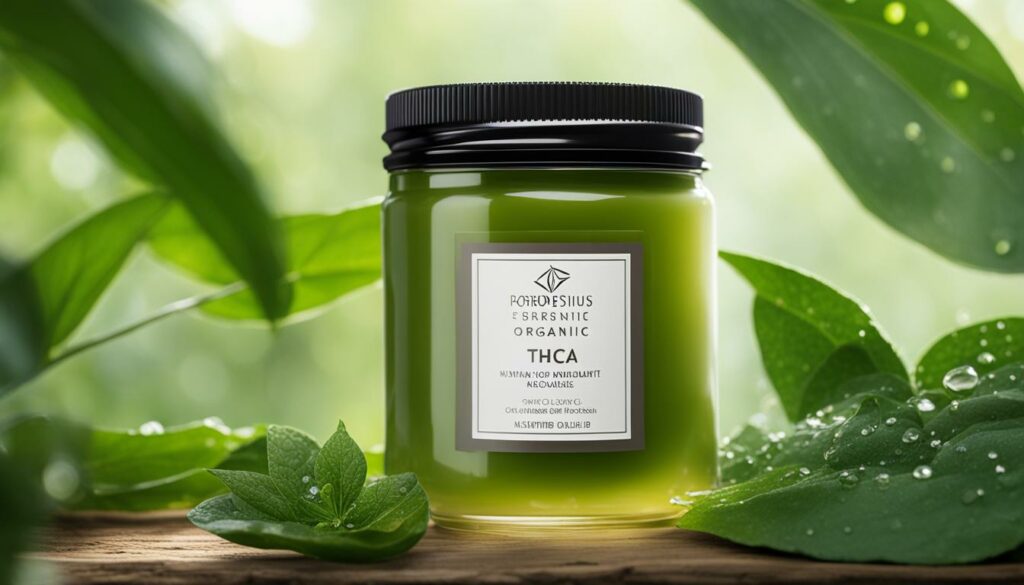
THCA, a non-psychoactive cannabinoid found in hemp, offers numerous advantages and benefits for various wellness purposes. Unlike THC, THCA does not produce a psychoactive effect, making it an appealing option for individuals seeking the therapeutic benefits of cannabis without the high.
THCA for Anti-Inflammatory Relief
One of the significant advantages of THCA is its potential for anti-inflammatory relief. Research suggests that THCA may help reduce inflammation in the body, offering a natural and holistic approach to managing inflammation-related conditions. Its anti-inflammatory properties make THCA an attractive supplement for individuals looking for non-pharmaceutical solutions to chronic inflammation.
THCA in Skin Care Benefits
THCA also holds promise in improving skin health and providing various benefits when incorporated into skincare products. Its potential antioxidant and anti-inflammatory properties may help soothe and nourish the skin, resulting in a healthier and more radiant complexion. With the growing demand for natural and plant-based skincare solutions, THCA is emerging as an exciting ingredient in the skincare industry.
THCA for Sleep Enhancement
In the realm of sleep enhancement, THCA shows potential in promoting improved sleep quality. Its calming and relaxing effects may help individuals struggling with sleep disorders or insomnia achieve a restful night’s sleep. By addressing the underlying causes of sleep disturbances, THCA offers a natural alternative for individuals seeking better sleep without the side effects commonly associated with traditional sleep aids.
As the popularity of non-psychoactive cannabinoids like THCA continues to rise, more and more individuals are incorporating THCA products into their wellness routines. From therapeutic gummies to soothing topicals, the market for THCA-infused products is expanding, catering to diverse consumer needs and preferences.
By exploring the advantages and benefits of THCA, individuals can tap into the potential of this non-psychoactive cannabinoid for anti-inflammatory relief, skincare, and sleep enhancement.
| Advantages of THCA | Benefits |
|---|---|
| Anti-inflammatory Relief | Reduces inflammation in the body |
| Skin Care | Improves skin health and radiance |
| Sleep Enhancement | Promotes better sleep quality |
The Science Behind THCA and Its Conversion to THC
Understanding the science behind THCA and its conversion to THC is crucial for harnessing the full potential of this non-psychoactive cannabinoid. THCA, or tetrahydrocannabinolic acid, is found in abundance in hemp and has gained significant attention for its potential therapeutic benefits.
Unlike THC, which is responsible for the psychoactive effects of cannabis, THCA does not produce the same mind-altering effects. However, when exposed to heat, THCA undergoes a process called decarboxylation, converting it into THC. This conversion occurs through the removal of a carboxyl group, which is triggered by heat or smoking.
Decarboxylating THCA at home is a relatively simple process. By applying low heat for an extended period of time, you can activate THCA and convert it into THC. This allows you to experience the potential benefits associated with THC without the psychoactive effects commonly associated with it.
The chemistry behind THCA decarboxylation involves the breaking of chemical bonds within the THCA molecule, resulting in the release of carbon dioxide and the formation of THC. The decarboxylation process is influenced by various factors, including temperature, time, and moisture content.
Understanding the science and process of THCA conversion to THC opens up a world of possibilities for utilizing this cannabinoid. Whether you’re interested in exploring the potential therapeutic benefits of THC or customizing your THCA dosages, having a solid understanding of the science behind THCA is essential.
THCA’s Legal Landscape in 2024

As the popularity of THCA continues to rise, it’s essential to understand its legal status in the ever-evolving cannabis industry. In 2024, the legal landscape surrounding THCA has seen significant changes and developments, reflecting the growing acceptance and recognition of its therapeutic potential.
Hemp-Derived THCA Legality
One crucial aspect to consider is the legality of hemp-derived THCA. Due to the passage of the 2018 Farm Bill, hemp and its derivatives, including cannabinoids like THCA, are legal on a federal level. This legislation defines hemp as cannabis containing less than 0.3% THC, making THCA derived from compliant hemp plants legal.
This legal distinction allows for the production, sale, and consumption of hemp-derived THCA products across the United States. Consumers can find a wide range of options, including THCA-infused gummies, tinctures, and more, all made from hemp plants that meet the federally defined criteria.
Is THCA Legal in My State?
While hemp-derived THCA is legal on a federal level, it’s important to consider the variations in state laws regarding cannabinoids. The legalization and regulation of cannabis products, including THCA, can differ from state to state.
If you are wondering whether THCA is legal in your state, it is crucial to consult the specific laws and regulations in your region. Certain states have fully legalized cannabis, allowing for the sale and consumption of THCA products both medicinally and recreationally. Other states may have legalized cannabis for medical use only, making THCA accessible to patients with qualifying conditions.
However, some states still have strict laws regarding cannabis and its derivatives, which might impact the legality of THCA products. It’s essential to research and understand the legal framework in your state to ensure compliance with local regulations.
As the legal landscape surrounding THCA evolves, it is advisable to stay updated on any changes or developments in your state. This will ensure that you can make informed decisions regarding the purchase and use of THCA products while adhering to local laws.
THCA Legal Status by State
| State | THCA Legal Status |
|---|---|
| California | Legal for both medical and recreational use |
| Colorado | Legal for both medical and recreational use |
| Texas | Illegal for recreational use, legal for medical use with restrictions |
| New York | Legal for both medical and recreational use |
| Florida | Legal for medical use with restrictions |
Note: This table provides a general overview and may not reflect the most recent legal changes. It is essential to consult local laws and regulations in your state for the most up-to-date information.
Consumer’s Guide to Available THCA Products
As the demand for THCA products continues to rise, consumers are seeking guidance on the best options for their specific needs. In this section, we will provide recommendations and information on where to find the best THCA gummies, rolls, and tinctures.
Best THCA Gummies for Sleep
When it comes to enhancing sleep quality, THCA gummies have gained popularity among users. These gummies combine the potential benefits of THCA with the convenience of a tasty treat. The calming properties of THCA make it an ideal choice for those looking to promote better sleep. To find the best THCA gummies for sleep, we recommend considering reputable brands that prioritize quality and transparency in their manufacturing process.
Where to Buy THCA Rolls
If you prefer a more traditional consumption method, THCA rolls might be the right choice for you. These rolls offer a convenient and discreet way to enjoy the benefits of THCA. When purchasing THCA rolls, it is essential to choose trusted sources that prioritize product purity and safety. Look for suppliers that provide clear product information and lab test results to ensure you are getting a high-quality product.
THCA Tinctures for Anxiety
THCA tinctures have gained popularity among individuals seeking anxiety relief. The fast-acting effects of tinctures make them an ideal choice for managing anxiety symptoms. To find the best THCA tinctures for anxiety, we recommend searching for reputable brands that use high-quality ingredients and provide clear dosing instructions. Additionally, consider consulting with a healthcare professional to determine the appropriate dosage for your specific needs.
When exploring THCA products, it is crucial to prioritize quality and safety. Look for reputable sources and brands that prioritize transparency in their manufacturing processes. Additionally, consider consulting with a healthcare professional to determine the right THCA product and dosage for your unique wellness needs.
Maximizing the Therapeutic Potential of THCA

In the quest for alternative therapeutic options, many individuals are turning to THCA, a non-psychoactive cannabinoid found in hemp. With its potential to offer relief from chronic pain and various other health conditions, maximizing the therapeutic potential of THCA has become an area of interest.
THCA for Chronic Pain Management
One of the primary applications of THCA is in chronic pain management. Research suggests that THCA may have anti-inflammatory properties, which can help reduce pain and discomfort associated with conditions like arthritis, fibromyalgia, and multiple sclerosis.
THCA has shown promise in relieving chronic pain by targeting inflammation. Its analgesic effects make it a potential natural alternative to traditional pain medications.
People experiencing chronic pain can benefit from incorporating THCA into their wellness routine. By harnessing the potential of THCA, individuals may experience improved pain management, enhanced quality of life, and reduced reliance on pharmaceutical interventions.
Exploring THCA’s Therapeutic Potential
While research on THCA is still emerging, there is growing interest in exploring its broad therapeutic potential. Beyond chronic pain management, THCA has shown promise in various health conditions, including neurodegenerative disorders, epilepsy, and mood disorders.
As scientists continue to study THCA and its effects on the body, the potential applications of this cannabinoid may expand. By delving deeper into the therapeutic potential of THCA, researchers aim to unlock its various benefits and develop targeted treatment options.
Customizing THCA Dosages
When it comes to maximizing the therapeutic potential of THCA, finding the right dosage is crucial. Every individual’s response to THCA may vary, and it’s essential to customize dosages according to personal needs and preferences.
Beginners should start with a lower dosage and gradually increase until desired effects are achieved. Consulting with a healthcare professional, particularly one well-versed in cannabinoid therapies, can provide valuable guidance in determining optimal THCA dosages.
Customization is key when it comes to THCA dosage. Considering factors such as body weight, specific health conditions, and individual tolerance can help individuals tailor their THCA consumption for maximum therapeutic benefit.
In conclusion, by exploring the full potential of THCA, individuals can maximize the therapeutic benefits it offers. Whether for chronic pain management or broader health conditions, THCA presents a promising avenue for natural relief and improved well-being. Through customized dosages and ongoing research, the outlook for THCA as a therapeutic option continues to evolve, offering hope for those seeking alternative wellness solutions.
THCA vs THC Effects: Understanding the Differences
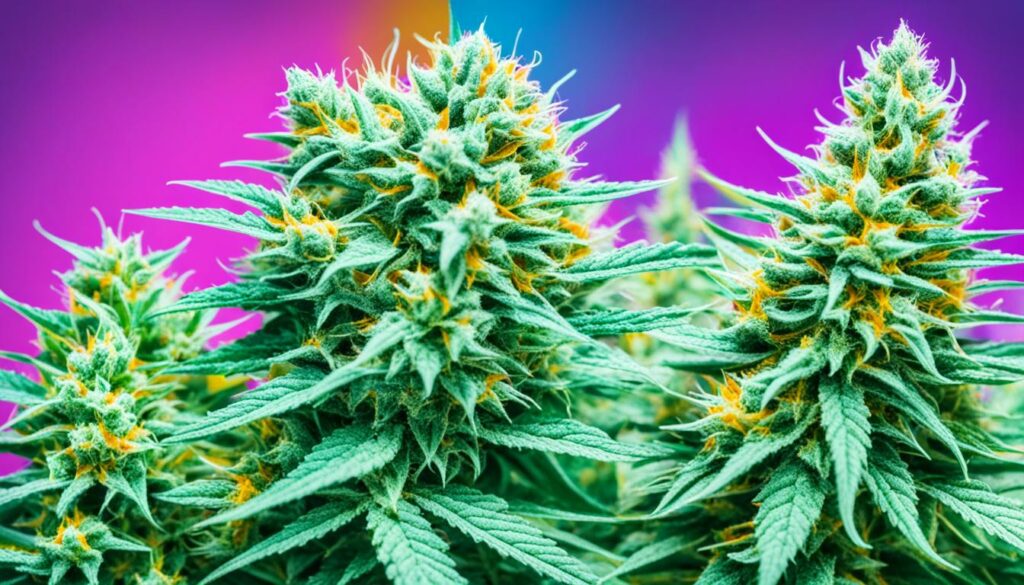
In the world of cannabinoids, understanding the differences between THCA and THC is crucial. While both compounds are derived from the cannabis plant, they have distinct effects on the body and mind.
THCA, or tetrahydrocannabinolic acid, is a non-psychoactive cannabinoid found in hemp. Unlike THC, THCA does not produce the typical “high” associated with cannabis consumption. Instead, THCA offers potential benefits as an anti-inflammatory agent and a sleep aid.
On the other hand, THC, or tetrahydrocannabinol, is the primary psychoactive compound in cannabis. When THC is heated, such as through smoking or vaping, it undergoes a process called decarboxylation, transforming into its psychoactive form. This is why THC is known for its intoxicating effects.
It’s important to note that THCA must be heated in order to be converted into THC and produce psychoactive effects. This means that consuming raw cannabis or hemp containing THCA will not result in the same psychoactive experience as using THC-rich products.
Understanding the differences between THCA and THC is essential for individuals seeking the therapeutic benefits of cannabinoids without the psychoactive effects. With the growing interest in alternatives to THC, hemp-derived cannabinoids like THCA are gaining popularity. The market for THCA products, such as rolls and gummies, is expanding rapidly as more consumers seek natural and therapeutic alternatives to traditional pharmaceutical options.
As the public becomes more educated on the potential benefits of THCA and other cannabinoids, the demand for these therapeutic compounds continues to rise. The availability of high-quality THCA products reflects a broader trend towards THC alternatives and the increasing recognition of the therapeutic potential of hemp-derived cannabinoids.
Innovations in THCA Extraction Methods
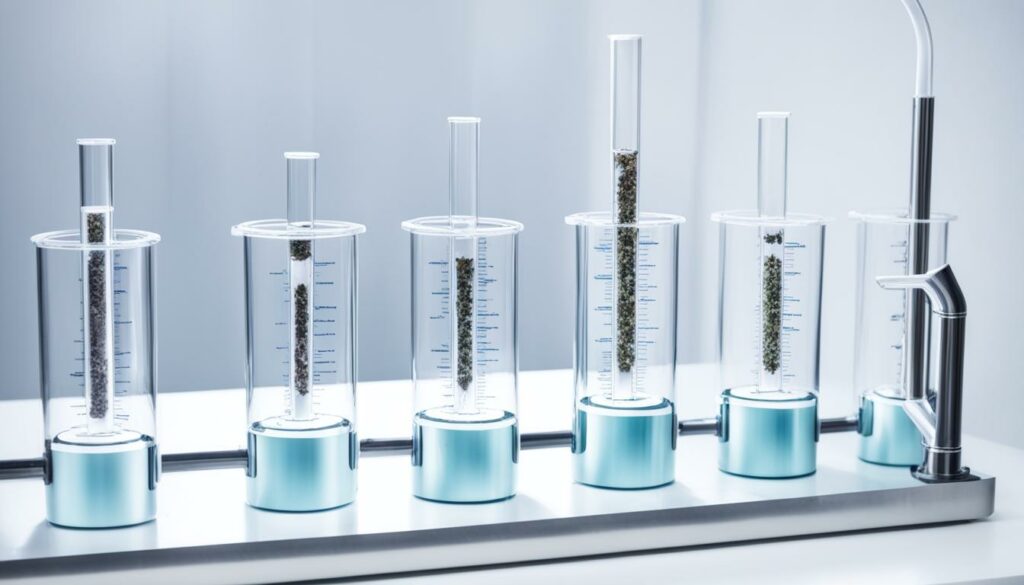
This section explores the latest innovations in THCA extraction methods, providing insights into how individuals can extract THCA at home, strategies for maximizing THCA in cannabis plants, and sustainable sourcing practices for THCA production.
DIY THCA Extraction Methods
For those interested in extracting THCA at home, several DIY methods can be used. One popular method is the alcohol extraction method, which involves soaking cannabis plant material in high-proof alcohol to extract the THCA. Another method is the rosin press, where heat and pressure are applied to cannabis flowers to extract THCA-rich resin.
It is important to research and follow proper safety precautions when attempting DIY THCA extraction. This includes using high-quality cannabis material, working in a well-ventilated area, and following appropriate temperature and time guidelines to achieve optimal results.
Maximizing THCA in Cannabis
Maximizing THCA in cannabis plants requires careful cultivation and harvesting techniques. Factors such as genetics, growing conditions, and maturity of the plant can influence THCA levels. Utilizing strains known for their high THCA content and providing the plants with optimal growing conditions can help maximize THCA production.
Harvesting the cannabis plants at the right time is crucial for obtaining high THCA levels. Waiting until the plants have reached their peak maturity ensures maximum THCA potency and quality. Proper drying and curing techniques also contribute to preserving THCA content.
Sustainable THCA Sourcing
As the demand for THCA grows, sustainable sourcing practices are becoming increasingly important. Sustainable THCA sourcing involves cultivating cannabis using environmentally friendly methods, minimizing the use of pesticides and synthetic fertilizers, and embracing organic farming practices.
Some companies are also exploring alternative methods for THCA production, such as utilizing byproducts from other industries or implementing closed-loop extraction systems that reduce waste and energy consumption.
By prioritizing sustainable sourcing methods, consumers can support companies that prioritize environmental stewardship and contribute to the overall sustainability of the THCA industry.
Combining THCA Benefits with Other Cannabinoids for Synergistic Effects
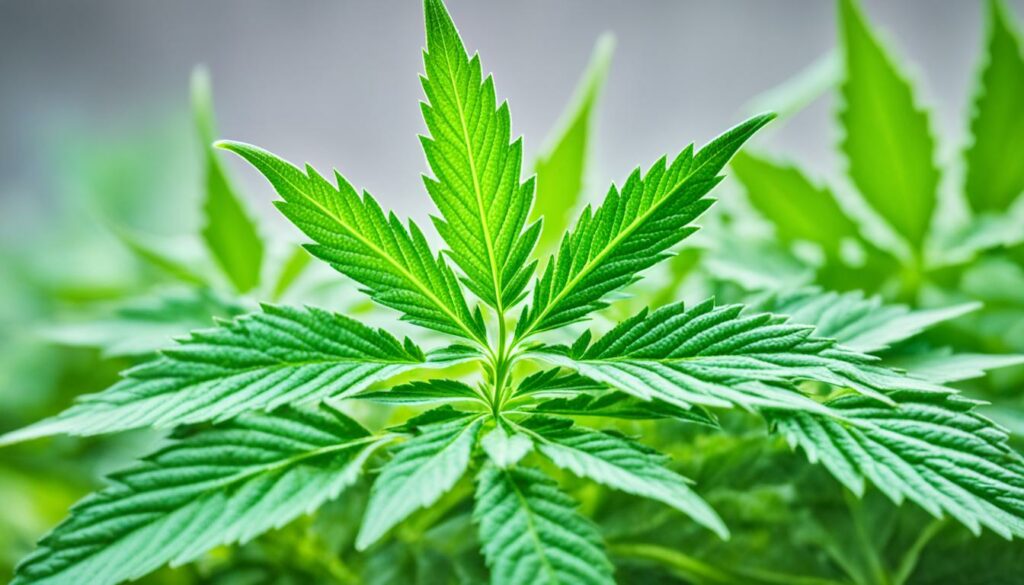
In the world of cannabinoids, combining different compounds can result in synergistic effects that enhance their individual therapeutic benefits. This holds true for THCA, a non-psychoactive cannabinoid found in hemp, which can be combined with other cannabinoids to potentially amplify its effects.
THCA’s Role in the Entourage Effect
One important concept to understand is the entourage effect, which suggests that the combined presence of multiple cannabinoids, terpenes, and other compounds in the cannabis plant can produce more significant therapeutic effects than isolated cannabinoids alone. THCA plays a role in the entourage effect by interacting with other cannabinoids, such as CBD and CBG, to potentially enhance their individual benefits.
Combining THCA with Other Cannabinoids
Combining THCA with specific cannabinoids allows users to customize their desired effects. For example, combining THCA with CBD may create a synergistic effect that can potentially promote pain relief and reduce inflammation. Similarly, combining THCA with CBG might enhance its potential in providing anxiety relief and supporting overall well-being.
Full-Spectrum Hemp with THCA
Full-spectrum hemp products contain a wide array of cannabinoids, including THCA, as well as other beneficial compounds like terpenes and flavonoids. Choosing full-spectrum hemp products that include THCA ensures that you are experiencing the entourage effect and maximizing the potential benefits of multiple cannabinoids working together.
By combining THCA with other cannabinoids and opting for full-spectrum hemp products, individuals can explore the synergistic effects of different compounds and potentially unlock enhanced therapeutic benefits.
Best Practices: Using, Storing, and Enjoying THCA Safely
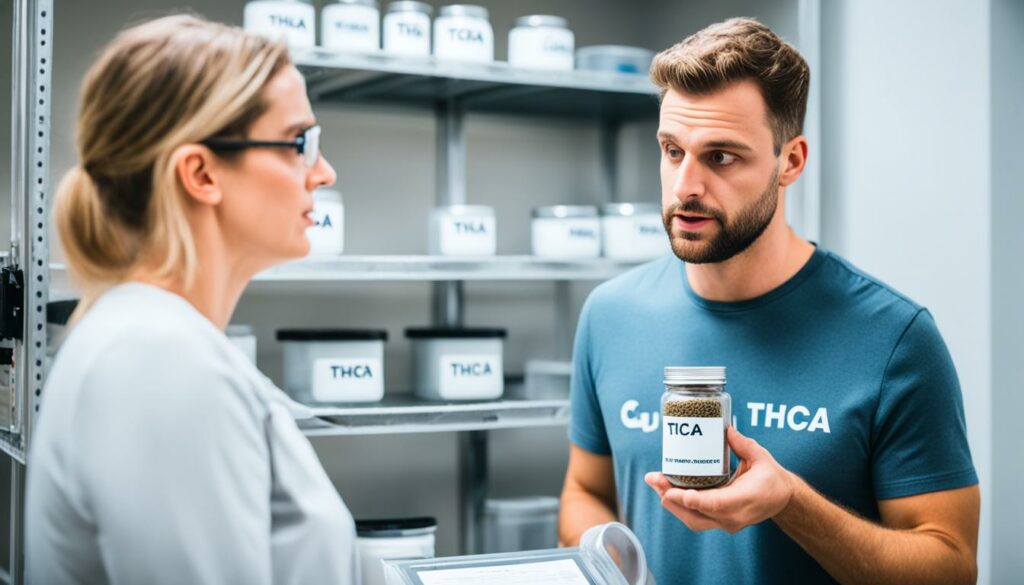
When it comes to utilizing THCA, it is essential to follow best practices to ensure your safety and maximize the benefits. Below are some tips and guidelines for using, storing, and enjoying THCA safely:
- Start with a low dosage: If you are new to THCA, begin with a small dosage and gradually increase it as needed. This approach allows you to assess your tolerance and gauge the effects of THCA on your body.
- Select your preferred consumption method: THCA can be consumed in various forms, such as gummies, tinctures, or rolls. Choose the method that aligns with your preferences and needs, whether it’s a discreet tincture or a tasty gummy.
- Store THCA products correctly: To maintain the potency and quality of your THCA products, store them in a cool, dark place away from direct sunlight and heat sources. Proper storage ensures that the THCA remains effective over time.
Remember to keep your THCA products out of reach of children and pets. Store them securely to prevent unintended access.
By following these best practices, you can safely incorporate THCA into your wellness routine and experience its potential benefits. However, it’s important to consult with a healthcare professional before introducing any new supplements or products into your regimen.
Conclusion
In conclusion, THCA is a non-psychoactive cannabinoid found in hemp that offers numerous potential benefits. Its anti-inflammatory properties make it an appealing option for those seeking relief from inflammation-related conditions. Additionally, THCA has shown promise in improving sleep quality, making it a valuable tool for individuals struggling with sleep disturbances.
It is important to note that THCA requires heat activation to become psychoactive. When heated, THCA converts into THC, which can produce psychoactive effects. This key distinction ensures that THCA offers a unique cannabinoid experience without the psychoactive element commonly associated with THC.
The popularity of THCA products, such as rolls and gummies, is a testament to the growing interest in therapeutic cannabinoids. As consumers increasingly seek THC alternatives, the market for hemp-derived cannabinoids like THCA continues to expand. With its potential health benefits and legal status, THCA presents a promising option for individuals looking to explore the world of cannabinoids.







